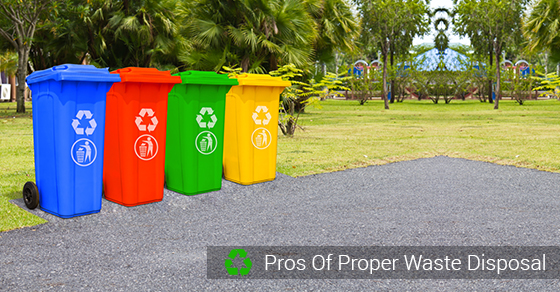In our fast-paced world, waste removal has become an essential practice that keeps our surroundings clean and our lives more organized. Whether it’s rubbish piling up in our homes or the need for a complete house clearance, efficient waste removal not only ensures a clutter-free environment but also contributes to sustainability. As we navigate through the intricacies of waste management, it is imperative to embrace methods that prioritize both efficiency and sustainability.
When it comes to waste removal, one cannot underestimate the importance of efficiency. With schedules packed and time at a premium, no one wants to spend excessive hours dealing with their own rubbish. Efficient waste removal solutions provide a quick and hassle-free way to dispose of unwanted items. From old furniture and appliances to garden waste and general rubbish, timely removal eliminates the burden of clutter, allowing us to reclaim our spaces and enjoy a more organized lifestyle. Packing the waste removal process with efficiency means less time wasted and more time to focus on the things that truly matter.
However, efficiency should not overshadow the need for sustainability in waste removal practices. With environmental concerns escalating, it has become crucial to adopt eco-friendly methods that minimize the negative impact of waste on our planet. Sustainable waste removal means looking beyond mere disposal; it involves recycling and proper waste segregation. By diverting recyclable materials from landfills and encouraging their transformation into reusable resources, we can contribute to the conservation of our natural resources while also curbing the detrimental effects of excessive waste generation. Prioritizing sustainability in waste removal ensures that we not only maintain a clean-cut world but also protect the environment for generations to come.
In the art of waste removal, finding the balance between efficiency and sustainability is the key to success. By embracing efficient practices that save time and effort, while also championing sustainability to mitigate the environmental impact, we can create a harmonious approach to waste removal. Let us navigate this clean-cut world by always considering the most effective and sustainable methods of waste removal, ensuring that our surroundings remain organized, clean, and beneficial both for us and the planet.
Efficient Waste Removal Practices
In today’s fast-paced world, efficient waste removal practices play a crucial role in maintaining cleanliness and sustainability. With the constant influx of waste produced by households and businesses, it is essential to adopt methods that promote efficiency and minimize environmental impact. In this section, we will explore three key practices that can revolutionize waste removal: proper segregation, recycling initiatives, and embracing innovative technologies.
The first step towards efficient waste removal is proper segregation. By separating waste into different categories such as recyclables, organic waste, and non-recyclables, we can streamline the disposal process. This practice not only simplifies waste management but also enables recycling centers and composting facilities to effectively process and convert waste into valuable resources. Educating individuals and businesses about the importance of segregation is vital to ensure the success of waste removal endeavors.
Furthermore, recycling initiatives are essential in minimizing the amount of waste that ends up in landfills. Encouraging the use of recycled materials not only reduces the demand for raw resources but also decreases energy consumption and greenhouse gas emissions associated with manufacturing new products. Public awareness campaigns and accessible recycling facilities can contribute to boosting recycling rates, thereby promoting a more sustainable waste removal system.
In addition to proper segregation and recycling, embracing innovative technologies can significantly enhance waste removal practices. Advancements in waste management technologies, such as waste-to-energy systems and smart waste collection systems, offer efficient and eco-friendly alternatives. Waste-to-energy systems convert waste into renewable energy, reducing the dependence on fossil fuels and mitigating the impacts of climate change. Smart waste collection systems employ IoT (Internet of Things) devices and sensors to optimize waste collection routes, reducing fuel consumption and optimizing the overall efficiency of waste removal processes.
Efficiency and sustainability are at the heart of modern waste removal practices. By implementing proper segregation, encouraging recycling initiatives, and embracing innovative technologies, we can create a clean-cut world that effectively manages waste while preserving the environment for future generations.
Sustainable Approaches to Rubbish Removal
In today’s increasingly eco-conscious society, the need for sustainable waste removal practices has become more prominent than ever before. As we strive to minimize our impact on the environment, it is essential to adopt efficient and environmentally friendly methods when it comes to rubbish removal. Here are a few sustainable approaches to consider:
- Man And Van Sheffield
Recycling: Recycling plays a crucial role in waste management, allowing us to divert materials from ending up in landfills. By sorting and segregating recyclable items such as paper, plastic, glass, and metal, we can ensure that they are properly processed and turned into new products. Recycling not only conserves resources but also reduces the amount of waste that needs disposal.
-
Composting: Composting is an excellent way to manage organic waste and turn it into nutrient-rich soil. By composting food scraps, yard waste, and other biodegradable materials, we can significantly reduce the amount of rubbish that goes into landfills. The resulting compost can then be used to nourish gardens, reducing the need for chemical fertilizers.
-
Donation and Reuse: Another sustainable approach to rubbish removal is donating or reusing items that are still in good condition. Instead of throwing away household items, clothing, or furniture, consider donating them to charitable organizations or giving them away to someone in need. Reusing and repurposing items not only reduces waste but also helps conserve resources that would otherwise be used in the production of new goods.

By implementing these sustainable approaches to rubbish removal, we can make a positive impact on the environment and contribute to a cleaner and more sustainable future. Remember, every small step counts, and together, we can make a significant difference in reducing waste and promoting a clean-cut world.
The Importance of Responsible House Clearances
A responsible approach to house clearances is essential for maintaining a sustainable and clean environment. By being mindful of how we dispose of our household waste, we can make a positive impact on both our immediate surroundings and the larger ecosystem.
Firstly, responsible house clearances help to minimize the negative effects of waste on our environment. When we dispose of our rubbish properly, we prevent pollution of the land, water, and air. By recycling and reusing items whenever possible, we reduce the strain on natural resources and decrease the amount of waste that ends up in landfills.
Secondly, responsible waste removal contributes to the overall cleanliness and aesthetics of our communities. A clutter-free environment not only promotes physical well-being but also has a positive impact on mental health. A clean-cut and organized living space is more inviting and provides a sense of comfort and peace.
Lastly, responsible house clearances are also crucial for public health. Proper waste management practices ensure that hazardous materials and potentially harmful substances are disposed of correctly. This not only protects individuals from immediate health risks but also prevents long-term damage to our ecosystems.
In conclusion, taking a responsible approach to house clearances is essential for the well-being of both our immediate environment and the planet as a whole. By prioritizing sustainability and efficiency in waste removal, we create cleaner and healthier spaces for ourselves and future generations.

